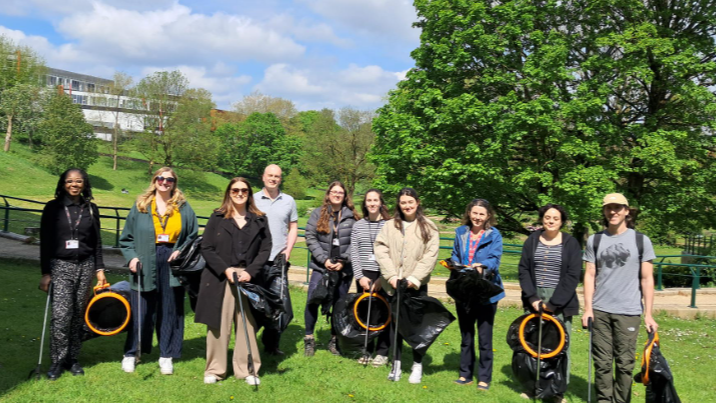Sustainability at the University of Salford
Welcome to the University of Salford’s Environmental Sustainability Blog
At The University of Salford, sustainability is at the heart of everything we do. Our mission goes beyond simply reducing our environmental impact; we aim to create an empowered community of students, staff, and external partners who actively shape a sustainable future.
Our Commitments and Actions
As a civic institution, we recognise the global climate and ecological crises. Our Sustainability Strategy acknowledges the three pillars of sustainability: environmental, social, and economic, and their interconnectedness. Our vision is by embedding sustainability in all aspects of University life, we will enable our University community to create impactful positive change for society and environment. This journey includes sustainable campus practices, integrating sustainability into our curriculum and research to empower our university community to drive change beyond campus. Here’s how we’re making a difference:
Sustainable Campus: We recognise our responsibility to address the climate and biological crises by mitigating the direct negative impacts of our own operations. We aim for a net-zero carbon campus by 2038 by implementing energy-efficient measures, decarbonising our buildings, implementing circular economy principles, promoting sustainable travel, and enhancing biodiversity on our grounds in collaboration with estates.
Sustainable Impact: We aim to create a sustainable impact beyond our campus. Our Education for Sustainable Development (ESD) programme, and participation in SOS-UK Responsible Futures, will prepare students to lead in a sustainable world. Our research tackles issues across environmental change; the need to move to a sustainable model for the economy; achieving net zero; technological transformation; political splintering; conflict; security; maintaining and improving social cohesion and human connection; and meeting increasing physical and mental health needs.
Sustainable Communities: Supporting sustainable communities creates partnerships beyond campus and enables a wider positive impact, empowering local and regional groups to address environmental, social, and economic challenges collaboratively, all supported by our communications and engagement strategy. Through these partnerships, we enable resilience, inclusivity, and sustainable development that benefits both our university and the communities we serve. Examples of this include our collaborations with local primary schools for the Hedgehog Friendly Campus programme, and our regular hedgehog friendly litter picks.



Our Sustainability Achievements and Goals
The SOS-UK Sustainability Skills Survey in 2023 showed that 89% of our students believe universities should actively promote sustainability.
Progress and Reporting: For the latest on our sustainability milestones and goals, view our annual reports and the University Integrated Annual Report, showcasing our dedication to sustainable growth and transparency. Progress updates are posted on our blog, such as those on energy reductions on campus.
Governance and Accountability: Guided by our Sustainability Strategy and Environmental Sustainability Policy, we work under the BS EN ISO 14001:2015 and ISO 50001:2018 certifications, ensuring our practices meet high standards for environmental management.
Latest News
-
Pedals & Purpose: Celebrating Cycling and Sustainability at Salford
At the University of Salford, we believe in connecting people, planet, and place – and this year’s World Bicycle Day was a perfect reflection of message. Cycling into Sustainability With a rare glimpse of sunshine overhead, our Sustainability Team hosted a guided bike tour to Kersal Wetlands – a stunning local green space with a…
-
World Bee Day 2025: Celebrating our Crucial Pollinators
20 March marks World Bee Day and what a glorious day it was for surveying Salford’s bees. Founded in 2018 by the United Nations, World Bee Day highlights the importance of bees and other pollinators. Pollination is a process which enables flowering plants to reproduce and is primarily facilitated by insects. Whilst feeding on flower…
-
Creating Community – Mental Health Awareness Week 2025
Communities can provide a sense of belonging, safety, support in hard times, and give us a sense of purpose. Creating strong connections with others through similar values and interests can help remind us that we are not alone. For Mental Health Awareness Week we are highlighting some of the sustainability activities we support that bring…
Find out more at salford.ac.uk/environmental-sustainability